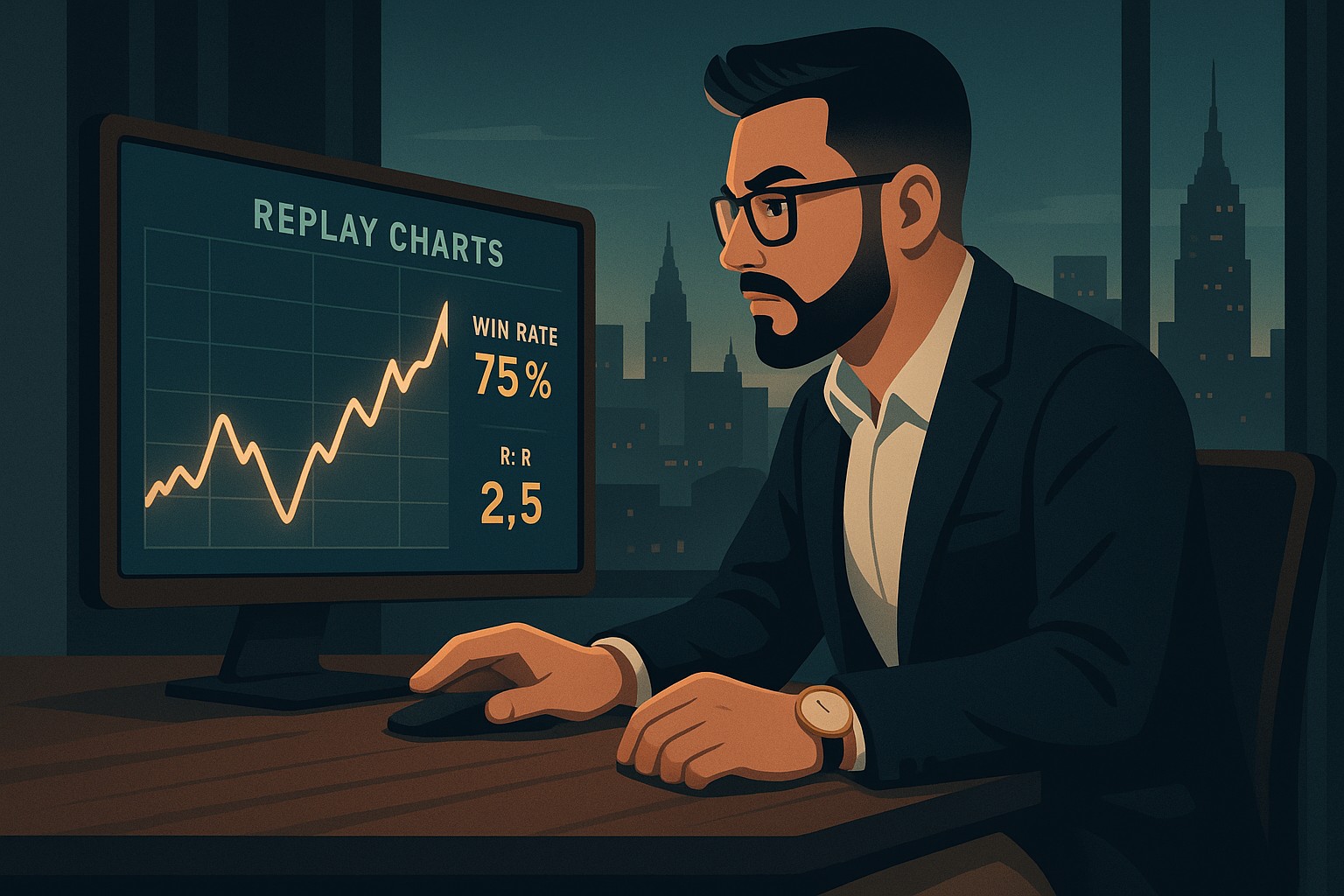Mastering Doubt in Trading: Building Confidence Through Backtesting and Pattern Recognition
2025-09-03 12:41:43
Every trader battles doubt. It creeps in after a losing streak, a missed entry, or even when a setup forms perfectly but fear whispers, “What if it fails?” Doubt is powerful because it strikes at the core of your confidence. The only way to quiet it isn't blind optimism but stacked evidence - through backtesting and pattern recognition. If you’re new to building a structured edge, start by grounding yourself in a simple, rule-based approach like this Forex Trading Strategy for Beginners, then layer your proof.

When you know your system through hundreds of repetitions, doubt loses its grip. This isn’t about predicting every trade correctly - it’s about being so familiar with your setup that hesitation fades and execution becomes automatic.
How Doubt Usually Impacts Traders
Doubt is a silent performance killer. Instead of following their plan, traders caught in doubt often hesitate at the entry, miss the ideal execution point, and then chase the market at worse levels. Other times, they cut winners too early because they don’t trust the move to run its course.

This constant second-guessing creates inconsistency - not because the system doesn’t work, but because the trader keeps breaking their own rules. If this sounds like you, tighten your mental game with a simple thought model in How to Think Like a Price Action Trader and log the behaviors in Trading Journal & Reflection - The Trader’s Mirror so patterns in your decision-making become visible.
Left unchecked, doubt doesn’t just cost pips - it erodes the trader’s identity. You go from “I am the kind of trader who executes my edge” to “I don’t know if I can trust myself.”
The Root Cause of Doubt
At its core, doubt comes from uncertainty. When traders don’t have enough data, testing, or structured experience with their setups, every trade feels like stepping into the dark. Without a clear statistical backbone, the mind fills the gap with fear.
Another root lies in overexposure to noise - jumping between strategies, scrolling through social media opinions, or reacting to every piece of news without context. The more conflicting voices you allow in, the harder it is to trust your own process.
Finally, doubt is often tied to identity misalignment. If deep down you don’t fully believe you are the kind of trader who respects your rules, you’ll sabotage your execution. This is why pairing technical routines like backtesting with mindset work such as Identity-Based Trading matters. Doubt shrinks when your actions and self-image align.
How to Use Doubt as an Edge
Doubt isn’t always the enemy. Used well, it’s a guardrail. It forces you to confirm alignment across timeframes and avoid impulse trades. Channel it into process by running quick confirmations: structure from your higher timeframe (see The Power of Multi-Timeframe Analysis in SMC), candle story clarity (Mastering Candlestick Pattern Analysis with the SMC Strategy), and target logic via How to Use Fibonacci to Set Targets & Stops.
When Doubt Becomes Dangerous
While doubt can act as a safeguard, too much of it turns into hesitation. If every trade is second-guessed, you risk not executing at all, missing valid opportunities, and breaking the consistency that builds long-term profitability. Healthy doubt sharpens execution; excessive doubt prevents it. The balance lies in preparation - knowing when to trust your system and when doubt is simply noise.
Backtesting as the Antidote

Backtesting is training before the fight. When you’ve run your setup through hundreds of historical charts, you start to see the same context repeat. You don’t just believe it works - you know it works, because the stats prove it. If you want a concrete blueprint for testing a fast-moving instrument, use the structure in The Ultimate Guide to Backtesting and Trading Gold (XAU/USD) Using SMC and adapt the workflow to your market. Pair this with the Moving Averages Trading Strategy Playbook to define trend context before you test entries.
- You learn how often the setup wins.
- You understand average drawdown and typical reward.
- You recognize the conditions that strengthen or weaken it.
With data, doubt whispers - but stats shout louder.
Pattern Recognition - Building Muscle Memory
You don’t need every candlestick name. You need familiarity with your playbook. Use your backtests to create a visual library of your setup from clean market states and messy ones. If your approach uses momentum bursts or retest logic, refine recognition with Mastering Retests: Enter with Confirmation After a Breakout, and if you prefer simple momentum overlays while you learn structure, the Moving Averages Trading Strategy Playbook gives a clean scaffold for your eyes to latch onto.
Instead of asking, “Is this it?” you’ll simply know.
Real-Life Analogy - The Basketball Free Throw

A player at the line has shot the same motion thousands of times. The angle, release, and arc are familiar, so pressure matters less. Trading is your free throw. Repetition through backtesting and replay builds the same certainty in your mechanics. If you want a practice routine on a high-volatility market, rehearse entries using How To Trade & Scalp Indices at the Open Using SMC in TradingView’s replay mode.
Practical Steps to Build Confidence
1. Commit to one setup
- Keep it simple; build depth before breadth. A basic structure like Forex Trading Strategy for Beginners is enough to start.
2. Backtest 100+ trades
- Use the workflow from XAU/USD Backtesting with SMC as your template.
3. Track key stats
- Win rate, average R:R, MAE/MFE. When you’re ready, integrate risk rules from The Ultimate Guide to Risk Management in Trading - 2026.
4. Screenshot your playbook
- Tag examples by condition: trend, range, news, session open. Use Mastering Candlestick Pattern Analysis with SMC to label context, not just candles.
5. Rehearse in replay
- Practice execution on indices with Scalping the Open Using SMC or apply confirmation logic from Mastering Retests.
Final Thoughts

Doubt is natural - but it doesn’t have to dictate your decisions. Confidence isn’t born in the heat of live markets; it’s forged in the hours you spend testing, journaling, and reviewing your edge. The trader who knows their setup inside out isn’t fearless - they’re prepared.
This week’s challenge: backtest at least 20 examples of your setup using the structure in XAU/USD Backtesting with SMC and file every case in your Trading Journal & Reflection. Your future self trades with the confidence you build today.
FAQs
1. What is the main cause of doubt in trading?
The root cause of doubt is uncertainty — not having enough backtested data, switching between strategies too often, or lacking alignment between your trading identity and your system.
2. Can doubt actually help me as a trader?
Yes. Healthy doubt can serve as a guardrail, making you double-check your reasoning and avoid impulsive trades. The danger comes when doubt becomes excessive, leading to hesitation and missed opportunities.
3. How many trades should I backtest to reduce doubt?
A good starting point is at least 100 trades of the same setup across different conditions. This gives you enough statistical evidence to trust your system even during drawdowns.
4. How does pattern recognition reduce doubt?
By repeatedly seeing your setup play out, your brain builds familiarity. Instead of second-guessing each trade, you recognize the conditions instantly — like a basketball player shooting a free throw after thousands of practice reps.
Start Practicing with Confidence - Risk-Free!
- Trade forex, indices, gold, and more
- Access ACY, MT4, MT5, & Copy Trading Platforms
- Practice with zero risk
It’s time to go from theory to execution - risk-free.
Create an Account. Start Your Free Demo!
Check Out My Contents:
Strategies That You Can Use
Looking for step-by-step approaches you can plug straight into the charts? Start here:
- How To Trade & Scalp Indices at the Open Using Smart Money Concepts (SMC)
- How to Trade Breakouts Effectively in Day Trading with Smart Money Concepts
- Complete Step-by-Step Guide to Day Trading Gold (XAU/USD) with Smart Money Concepts (SMC)
- The Power of Multi-Timeframe Analysis in Smart Money Concepts (SMC)
- Forex Trading Strategy for Beginners
- Mastering Candlestick Pattern Analysis with the SMC Strategy for Day Trading
- How to Use Fibonacci to Set Targets & Stops (Complete Guide)
- RSI Divergence Trading Strategy for Gold: How to Identify and Trade Trend Reversals
- Stochastics Trading Secrets: How to Time Entries in Trending Markets using Stochastics
- Gold Trading Stochastics Strategy: How to Trade Gold with 2R–3R Targets
- RSI Hidden Divergence Explained: How to Spot Trend Continuations Like a Pro
- Moving Averages Trading Strategy Playbook
- Mastering Fibonacci Trading Psychology – Trusting the Levels, Managing the Mind
- Mastering Price Action at Key Levels – How to Spot, Trade, and Win at the Most Crucial Zones
- Mastering Retests: How to Enter with Confirmation After a Breakout
Indicators / Tools for Trading
Sharpen your edge with proven tools and frameworks:
- The Ultimate Guide to Risk Management in Trading - A Complete Compilation for 2026
- Moving Averages Trading Strategy Playbook
- How to Think Like a Price Action Trader
- Mastering Fibonacci Trading Psychology - Trusting the Levels, Managing the Mind
How To Trade News
News moves markets fast. Learn how to keep pace with SMC-based playbooks:
- Why Smart Money Concepts Work in News-Driven Markets - CPI, NFP, and More
- How to Trade NFP Using Smart Money Concepts (SMC)-A Proven Strategy for Forex Traders
- How to Trade CPI Like Smart Money - A Step-by-Step Guide Using SMC
Learn How to Trade US Indices
From NASDAQ opens to DAX trends, here’s how to approach indices like a pro:
- How to Start Trading Indices and Get into the Stock Market with Low Capital (2026 Guide)
- Best Indices to Trade for Day Traders | NASDAQ, S&P 500, DAX + Best Times to Trade Them
- How To Trade & Scalp Indices at the Open Using Smart Money Concepts (SMC)
- NAS100 - How to Trade the Nasdaq Like a Pro (Smart Money Edition)
How to Start Trading Gold
Gold remains one of the most traded assets — here’s how to approach it with confidence:
- How to Swing Trade Gold (XAU/USD) Using Smart Money Concepts: A Simple Guide for Traders
- Complete Step-by-Step Guide to Day Trading Gold (XAU/USD) with Smart Money Concepts (SMC)
- The Ultimate Guide to Backtesting and Trading Gold (XAU/USD) Using Smart Money Concepts (SMC)
- Why Gold Remains the Ultimate Security in a Shifting World
- How to Exit & Take Profits in Trading Gold Like a Pro: Using RSI, Range Breakdowns, and MAs as Your Confluence
How to Trade Japanese Candlesticks
Candlesticks are the building blocks of price action. Master the most powerful ones:
- Mastering the Top Japanese Candlesticks: The Top 5 Candlesticks To Trade + Top SMC Candlestick Pattern
- How to Trade Candlestick Patterns with High Probability: A Complete Guide for Beginners
- The Top Japanese Candlestick Guide: What is an Engulfing Pattern and How to Trade It?
- Piercing Pattern Candlestick Explained: How to Trade It - Step-By-Step Guide
- Morning & Evening Star Candlestick Patterns - How to Trade Market Reversals with Confidence
How to Start Day Trading
Ready to go intraday? Here’s how to build consistency step by step:
- 5 Steps to Start Day Trading: A Strategic Guide for Beginners
- 8 Steps How to Start Forex Day Trading in 2026: A Beginner’s Step-by-Step Guide
- 3 Steps to Build a Trading Routine for Consistency and Discipline - Day Trading Edition
- The Ultimate Guide to Understanding Market Trends and Price Action
- Trading with Momentum: The Best Trading Session to Trade Forex, Gold and Indices
Learn how to navigate yourself in times of turmoil
Markets swing between calm and chaos. Learn to read risk-on vs risk-off like a pro:
- How to Identify Risk-On and Risk-Off Market Sentiment: A Complete Trader’s Guide
- How to Trade Risk-On and Risk-Off Sentiment - With Technical Confirmation
- The Ultimate Guide to Understanding Market Trends and Price Action
Want to learn how to trade like the Smart Money?
Step inside the playbook of institutional traders with SMC concepts explained:
- Why Smart Money Concepts Work: The Truth Behind Liquidity and Price Action
- Mastering the Market with Smart Money Concepts: 5 Strategic Approaches
- Understanding Liquidity Sweep: How Smart Money Trades Liquidity Zones in Forex, Gold, US Indices
- The SMC Playbook Series Part 1: What Moves the Markets? Key Drivers Behind Forex, Gold & Stock Indices
- The SMC Playbook Series Part 2: How to Spot Liquidity Pools in Trading-Internal vs External Liquidity Explained
- Fair Value Gaps Explained: How Smart Money Leaves Footprints in the Market
- Accumulation, Manipulation, Distribution: The Hidden Cycle That Runs Every Market
- Institutional Order Flow – Reading the Market Through the Eyes of the Big Players
- London Session Trading Secrets: How Smart Money Sets the High & Low of the Day
- Mastering the New York Session - Smart Money Concepts Guide
Master the World’s Most Popular Forex Pairs
Forex pairs aren’t created equal — some are stable, some are volatile, others tied to commodities or sessions.
- The Top 5 All-Time Best Forex Pairs to Trade
- Top Forex Pairs Beyond the Big Five
- EUR/USD: The King of Forex
- USD/JPY: The Fast Mover
- GBP/USD: The Volatile Cable
- AUD/USD: The Commodity Currency
- USD/CAD: The Oil-Backed Pair
- GBP/JPY: How to Trade The Beast
- Asian & London Session Secrets
- Mastering the New York Session
Stop Hunting 101
If you’ve ever been stopped out right before the market reverses — this is why:
- Stop Hunting 101: How Swing Highs and Lows Become Liquidity Traps
- Outsmarting Stop Hunts: The Psychology Behind the Trap
- How to Lessen Risk From Stop Hunts in Trading
- How Stop Hunts Trigger Revenge Trading - Breaking the Pain Cycle
- How to Accept Stop Hunts Without Losing Discipline - Shifting From Frustration to Focus
Trading Psychology
Mindset is the deciding factor between growth and blowups. Explore these essentials:
- The Mental Game of Execution - Debunking the Common Trading Psychology
- Managing Trading Losses: Why You Can Be Wrong and Still Win Big in Trading
- The Hidden Threat in Trading: How Performance Anxiety Sabotages Your Edge
- Why 90% of Retail Traders Fail Even with Profitable Trading Strategies
- Top 10 Habits Profitable Traders Follow Daily to Stay Consistent
- Top 10 Trading Rules of the Most Successful Traders
- Top 10 Ways to Prevent Emotional Trading and Stay Disciplined in the Markets
- Why Most Traders Fail – Trading Psychology & The Hidden Mental Game
- Emotional Awareness in Trading – Naming Your Triggers
- Discipline vs. Impulse in Trading – Step-by Step Guide How to Build Control
- Trading Journal & Reflection – The Trader’s Mirror
- Overcoming FOMO & Revenge Trading in Forex – Why Patience Pays
- Risk of Ruin in Trading - Respect the Math of Survival
- Identity-Based Trading: Become Your Trading System for Consistency
- Trading Psychology: Aligning Emotions with Your System
- Mastering Fear in Trading: Turn Doubt into a Protective Signal
- Mastering Greed in Trading: Turn Ambition into Controlled Growth
- Mastering Boredom in Trading: From Restless Clicking to Patient Precision
Risk Management
The real edge in trading isn’t strategy — it’s how you protect your capital:
- Mastering Risk Management: Stop Loss, Take Profit, and Position Sizing
- Why Risk Management Is the Only Edge That Lasts
- How Much Should You Risk per Trade? (1%, 2%, or Less?)
- The Ultimate Risk Management Plan for Prop Firm Traders – Updated 2026
Suggested Learning Path
If you’re not sure where to start, follow this roadmap:
- Start with Trading Psychology → Build the mindset first.
- Move into Risk Management → Learn how to protect capital.
- Explore Strategies & Tools → Candlesticks, Fibonacci, MAs, Indicators.
- Apply to Assets → Gold, Indices, Forex sessions.
- Advance to Smart Money Concepts (SMC) → Learn how institutions trade.
- Specialize → Stop Hunts, News Trading, Turmoil Navigation.
This way, you’ll grow from foundation → application → mastery, instead of jumping around randomly.
Follow me for more daily market insights!
Jasper Osita - LinkedIn - FXStreet - YouTube
This content may have been written by a third party. ACY makes no representation or warranty and assumes no liability as to the accuracy or completeness of the information provided, nor any loss arising from any investment based on a recommendation, forecast or other information supplies by any third-party. This content is information only, and does not constitute financial, investment or other advice on which you can rely.
Try These Next











